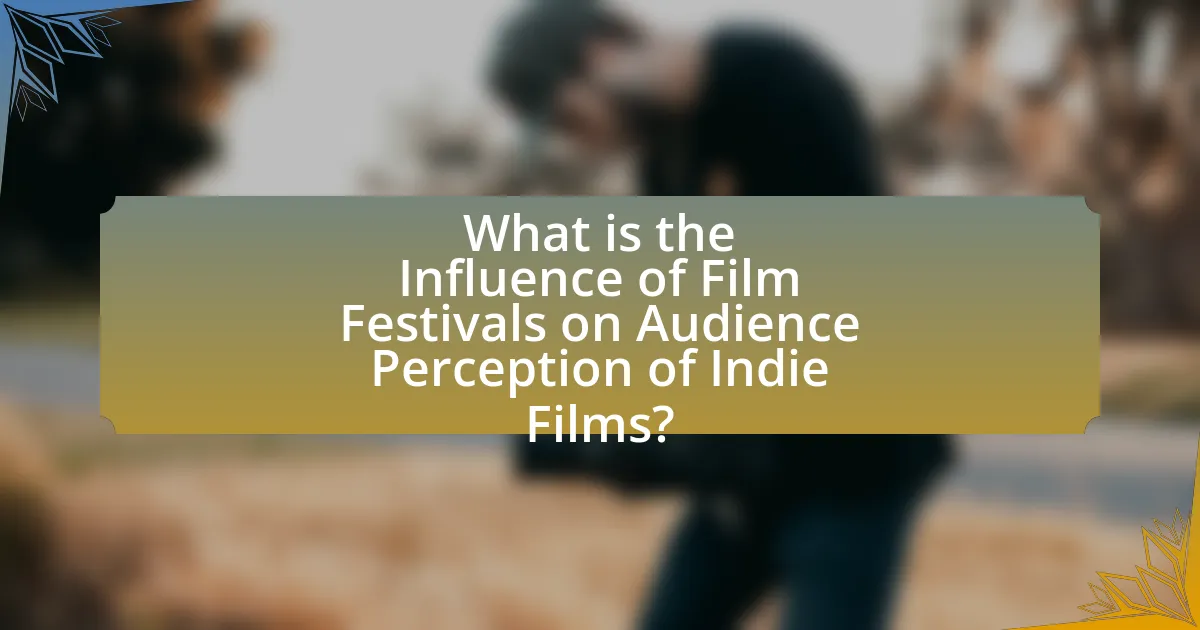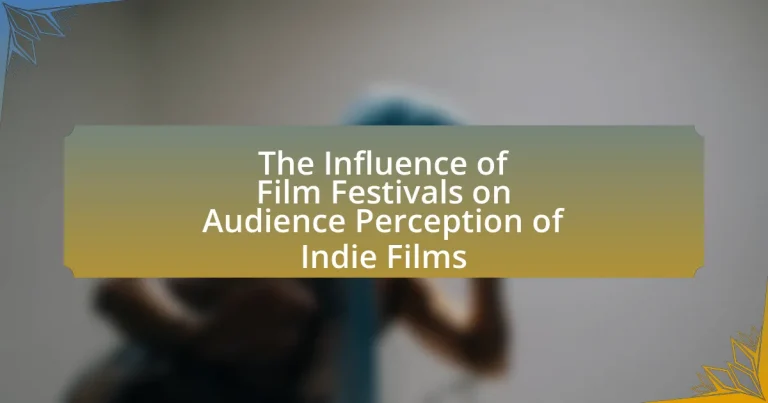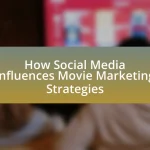The article examines the influence of film festivals on audience perception of indie films, highlighting their role in providing exposure, validation, and networking opportunities for independent filmmakers. It discusses how prestigious festivals like Sundance and Cannes enhance the perceived quality of indie films, leading to increased viewership and box office success. Additionally, the article explores factors such as audience demographics, festival reputation, and the impact of awards on perceptions, as well as common misconceptions about indie films. Ultimately, it emphasizes the importance of film festivals in shaping audience expectations and enhancing the overall success of independent cinema.

What is the Influence of Film Festivals on Audience Perception of Indie Films?
Film festivals significantly influence audience perception of indie films by providing a platform for exposure and validation. These events often showcase independent films that may not receive mainstream distribution, allowing audiences to discover unique storytelling and diverse perspectives. Research indicates that films awarded at festivals, such as Sundance or Cannes, tend to receive higher ratings and increased viewership, as audiences associate festival recognition with quality. For instance, a study published in the Journal of Cultural Economics found that films screened at prestigious festivals experienced a 50% increase in box office revenue compared to those that were not. This correlation highlights how film festivals shape audience expectations and enhance the perceived value of indie films.
How do film festivals shape the viewing experience of indie films?
Film festivals significantly enhance the viewing experience of indie films by providing a curated platform that fosters audience engagement and critical discourse. These events create an intimate setting where filmmakers and audiences interact, allowing for direct feedback and discussions that deepen the understanding of the film’s themes and artistic choices. For instance, the Sundance Film Festival, known for showcasing independent cinema, has been instrumental in launching numerous successful indie films, demonstrating how festivals can elevate visibility and appreciation. Additionally, studies indicate that films screened at festivals often receive higher ratings and increased distribution opportunities, further validating the impact of these events on audience perception and the overall success of indie films.
What role do film festivals play in introducing indie films to audiences?
Film festivals play a crucial role in introducing indie films to audiences by providing a platform for independent filmmakers to showcase their work. These festivals often attract diverse audiences, including industry professionals, critics, and film enthusiasts, which enhances visibility for indie films. For instance, the Sundance Film Festival has been instrumental in launching the careers of numerous indie filmmakers, with films like “Little Miss Sunshine” and “Whiplash” gaining significant attention and distribution deals after their premieres. Additionally, festivals facilitate networking opportunities that can lead to further funding and support for indie projects, thereby fostering a vibrant indie film community.
How do festival screenings impact audience expectations of indie films?
Festival screenings significantly elevate audience expectations of indie films by showcasing unique storytelling and artistic innovation. These events often highlight films that challenge mainstream narratives, leading audiences to anticipate originality and emotional depth. Research indicates that films presented at festivals, such as Sundance or Cannes, receive heightened media attention and critical acclaim, which further shapes audience perceptions. For instance, a study by the University of Southern California found that festival exposure increases a film’s perceived quality and desirability, influencing viewers to expect a higher level of craftsmanship and thematic complexity in indie films.
Why are film festivals important for indie filmmakers?
Film festivals are crucial for indie filmmakers because they provide a platform for exposure and networking opportunities. These events allow filmmakers to showcase their work to diverse audiences, industry professionals, and potential distributors, significantly increasing the visibility of their films. According to a study by the Sundance Institute, films that premiere at festivals often gain critical acclaim and attract attention from major distributors, enhancing their chances of commercial success. Additionally, festivals facilitate connections with other filmmakers and industry insiders, fostering collaborations that can lead to future projects.
What opportunities do film festivals provide for indie filmmakers?
Film festivals provide indie filmmakers with critical networking opportunities, exposure to industry professionals, and platforms for audience engagement. These events allow filmmakers to connect with distributors, producers, and other filmmakers, which can lead to collaborations and funding opportunities. For instance, the Sundance Film Festival has been known to launch the careers of numerous indie filmmakers by facilitating connections that result in distribution deals. Additionally, festivals often feature Q&A sessions and panels, enabling filmmakers to engage directly with audiences, gather feedback, and enhance their visibility. This exposure can significantly influence audience perception, as films showcased at reputable festivals often gain credibility and attract wider viewership.
How do film festivals help in building a filmmaker’s reputation?
Film festivals significantly enhance a filmmaker’s reputation by providing a platform for exposure, networking, and recognition. Exposure at prestigious festivals like Sundance or Cannes can lead to critical acclaim, as films showcased often receive media attention and reviews that elevate the filmmaker’s profile. Networking opportunities arise from interactions with industry professionals, including producers and distributors, which can lead to future collaborations and funding for new projects. Additionally, awards won at these festivals serve as validation of a filmmaker’s talent, further solidifying their standing in the industry. For instance, films that win awards at major festivals often see increased distribution opportunities and audience interest, demonstrating the tangible benefits of festival participation in building a filmmaker’s reputation.
What factors contribute to audience perception at film festivals?
Audience perception at film festivals is influenced by several key factors, including the festival’s reputation, the selection of films, audience demographics, and the presence of filmmakers and talent. The reputation of a festival, such as Sundance or Cannes, can enhance the perceived quality of films showcased, as audiences often associate these events with high artistic standards. The selection of films, particularly the diversity and originality of the content, directly impacts audience engagement and emotional response. Audience demographics, including age, cultural background, and prior film knowledge, shape individual interpretations and preferences. Additionally, the presence of filmmakers and actors during screenings can create a more immersive experience, fostering a connection between the audience and the film. These factors collectively shape how audiences perceive and evaluate indie films presented at festivals.
How does the festival’s reputation influence audience perception?
The festival’s reputation significantly influences audience perception by shaping expectations and credibility. A well-regarded festival, such as Sundance or Cannes, attracts attention and garners trust, leading audiences to perceive films showcased there as higher quality or more innovative. Research indicates that films awarded at prestigious festivals often experience increased box office success and critical acclaim, demonstrating that audience perception is closely tied to the festival’s standing in the industry. For instance, a study published in the Journal of Cultural Economics found that films with festival accolades tend to receive higher ratings on platforms like Rotten Tomatoes, reinforcing the idea that a festival’s reputation directly impacts how audiences view the films presented.
What is the impact of awards and accolades on audience perception of indie films?
Awards and accolades significantly enhance audience perception of indie films by signaling quality and credibility. Recognition from prestigious film festivals, such as Sundance or Cannes, often leads to increased visibility and interest among viewers, as audiences tend to associate awards with artistic merit and storytelling excellence. Research indicates that films receiving accolades experience higher box office performance and greater critical acclaim, as evidenced by a study published in the Journal of Cultural Economics, which found that award-winning films often see a 30% increase in ticket sales compared to non-awarded counterparts. This correlation suggests that awards not only validate the film’s artistic value but also influence audience choices, making them more likely to engage with indie films that have received such recognition.
How do audience demographics affect perceptions of indie films at festivals?
Audience demographics significantly influence perceptions of indie films at festivals, as factors such as age, gender, and cultural background shape individual viewing experiences and interpretations. For instance, younger audiences may be more receptive to experimental storytelling and diverse narratives, while older viewers might prefer traditional structures and familiar themes. Research indicates that demographic factors can lead to varying levels of engagement and emotional response; for example, a study by the University of Southern California found that younger viewers are more likely to appreciate films that challenge societal norms, whereas older demographics often favor films that reinforce established values. This divergence in perception highlights how audience composition at festivals can affect the overall reception and success of indie films.
What demographic trends are observed in festival audiences?
Festival audiences exhibit notable demographic trends, including a predominance of younger attendees, particularly those aged 18 to 34, who represent a significant portion of the audience. This trend is supported by data from the 2020 Sundance Film Festival, which indicated that 60% of attendees fell within this age range. Additionally, festival audiences tend to be more diverse in terms of ethnicity compared to mainstream cinema audiences, with a growing representation of Black, Asian, and Hispanic individuals. Research from the 2019 Toronto International Film Festival highlighted that 40% of attendees identified as part of a minority group, reflecting a shift towards inclusivity. Furthermore, there is an increasing trend of higher educational attainment among festival-goers, with many holding college degrees, which correlates with a greater interest in independent and international films.
How do different audience segments respond to indie films?
Different audience segments respond to indie films based on their demographics, cultural backgrounds, and viewing preferences. For instance, younger audiences, particularly millennials and Gen Z, often embrace indie films for their unique storytelling and authenticity, as evidenced by a 2020 survey from the Sundance Institute, which found that 72% of younger viewers prefer films that challenge mainstream narratives. In contrast, older audiences may appreciate indie films for their artistic merit and character-driven plots, with a 2019 report from the National Endowment for the Arts indicating that 65% of viewers aged 50 and above value films that offer deeper emotional connections. Additionally, niche audiences, such as those interested in specific genres or social issues, often seek out indie films that align with their interests, leading to a more engaged viewing experience. This segmentation highlights how diverse audience preferences shape the reception of indie films across different demographics.
What are the common misconceptions about indie films at film festivals?
Common misconceptions about indie films at film festivals include the belief that they are of lower quality than mainstream films, that they lack commercial viability, and that they are only for niche audiences. Many people assume that indie films are poorly produced due to limited budgets, but numerous award-winning indie films, such as “Moonlight,” which won the Academy Award for Best Picture in 2017, demonstrate high production values and storytelling excellence. Additionally, the perception that indie films cannot achieve box office success is challenged by films like “Juno,” which grossed over $230 million worldwide against a budget of only $7.5 million. Lastly, the idea that indie films cater solely to niche audiences is misleading; festivals often showcase diverse genres and themes that appeal to a broad range of viewers, as evidenced by the varied audience turnout at major festivals like Sundance and Cannes.
How do stereotypes about indie films affect audience reception?
Stereotypes about indie films significantly influence audience reception by shaping expectations and perceptions of quality and content. Audiences often associate indie films with low budgets, unconventional storytelling, and niche themes, which can lead to preconceived notions that may deter them from engaging with the film. For instance, a study by the University of Southern California found that viewers are more likely to approach indie films with skepticism, believing they may lack the production value and entertainment appeal of mainstream films. This bias can result in lower attendance rates and diminished interest in exploring the diverse narratives that indie films offer, ultimately affecting their box office performance and critical reception.
What myths about film festivals influence audience perceptions of indie films?
Myths about film festivals significantly influence audience perceptions of indie films by creating misconceptions regarding their quality and accessibility. One prevalent myth is that only films with major studio backing can succeed at festivals, leading audiences to undervalue indie films that lack such support. Additionally, the belief that film festivals are exclusive events for elite filmmakers fosters the idea that indie films are not worthy of mainstream attention. Research indicates that audiences often equate festival awards with quality, which can skew perceptions, as many indie films receive accolades despite limited budgets and resources. These myths can deter potential viewers from engaging with indie films, ultimately affecting their reception and success in the market.
How can filmmakers leverage film festivals to enhance audience perception?
Filmmakers can leverage film festivals to enhance audience perception by showcasing their work in a curated environment that attracts engaged viewers and industry professionals. Film festivals provide a platform for filmmakers to present their films to a targeted audience, often leading to increased visibility and credibility. For instance, films that receive awards or recognition at prestigious festivals like Sundance or Cannes often experience a boost in audience interest and box office performance, as evidenced by the 2019 Sundance Film Festival, where films that premiered there saw a significant increase in distribution deals and audience reach. By participating in Q&A sessions and networking events, filmmakers can also directly engage with audiences, fostering a deeper connection and understanding of their work, which further enhances audience perception.
What strategies can indie filmmakers use to engage festival audiences?
Indie filmmakers can engage festival audiences by creating interactive experiences that foster connection and dialogue. These experiences can include Q&A sessions after screenings, where filmmakers discuss their creative process and answer audience questions, enhancing viewer investment in the film. Additionally, filmmakers can utilize social media campaigns to build anticipation and encourage audience participation before and during the festival, as evidenced by the success of films like “The Blair Witch Project,” which effectively used grassroots marketing to engage viewers. Furthermore, incorporating unique visual or auditory elements during the screening can captivate audiences, making the experience memorable and encouraging word-of-mouth promotion.
How can filmmakers utilize feedback from festivals to improve their films?
Filmmakers can utilize feedback from festivals to improve their films by analyzing audience reactions and critiques to identify strengths and weaknesses in their storytelling, pacing, and character development. This feedback often highlights specific scenes or elements that resonate or fall flat with viewers, allowing filmmakers to make targeted revisions. For instance, a study by the University of Southern California found that films receiving constructive feedback at festivals often see improved audience ratings in subsequent screenings, indicating that filmmakers who actively engage with festival feedback can enhance their films’ overall reception and effectiveness.
What best practices should filmmakers follow when participating in film festivals?
Filmmakers should prioritize networking, effective marketing, and audience engagement when participating in film festivals. Networking is crucial as it allows filmmakers to connect with industry professionals, potential collaborators, and distributors, enhancing their visibility and opportunities for future projects. Effective marketing involves creating a compelling press kit, utilizing social media, and engaging with festival audiences to generate buzz around their film. Audience engagement can be achieved through Q&A sessions, workshops, and interactive events, which foster a deeper connection with viewers and enhance their perception of the film. These practices are supported by the fact that successful festival participants often report increased distribution deals and audience reach, demonstrating the tangible benefits of strategic engagement at festivals.


